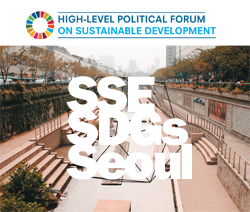At this side event, speakers will discuss new research evidence and local government experience of SSE, and the enabling conditions—such as institutional arrangements, political forces and economic possibilities—which are needed for it to succeed in diverse contexts.
In keeping with the mandate of the HPLF to provide guidance and recommendations on implementing the 2030 Agenda for Sustainable Development, the panellists at this event will share knowledge and experience on how SE is contributing to realizing the 2030 Agenda’s vision of transformation, and achieving the goals and targets at the local level, in particular in cities.
Programme
Moderator Laurence Kwark, Secretary-General of the Global Social Economy Forum (GSEF)Opening remarks
- Ambassador [Republic of Korea] (TBC)
- Daniela Bas, Director, Division for Inclusive Social Development, UN-DESA
Speakers
- Ilcheong Yi, UNRISD Senior Research Coordinator: SSE as a means of localizing and implementing the SDGs: Spotlight on the social economy in Seoul
- Marguerite Mendell, Professor, Concordia University: Co-construction of policies for SSE in Quebec
- Georgia Papoutsi, Policy Coordinator at the International Co-operative Alliance: Cooperatives and the SDGs in local settings
- Representative of Permanent Mission of Greece to the United Nations (TBC): Public policy in support of the social and solidarity economy in Greece (TBC)
- Jacinto Santos, Former Mayor of Praia, Cape Verde (TBC): Implementation of SDGs in Praia and SSE (TBC)
Closing remarks Ambassador [Mongolia] (TBC)
This event will be video and audio recorded. If you would like to be notified when the video and the podcast are online, please send an email with "Audio/video notification: HLPF Side Event” in the subject line to sergio.sandoval@un.org
Background
Several characteristics of the social and solidarity economy (SSE) mean that it aligns well with the integrated nature of the SDGs, and with building sustainable and resilient societies from the local level up. SSE is grounded in the principles of solidarity, social cohesion and collective action; activities build and strengthen localized circuits of production, exchange and consumption; environmental and social costs are internalized rather than externalized; and it is rooted in the local political economy.Localizing the SDGs means translating them from a global vision into local realities for communities, households and individuals. Goals and targets need to be adapted to local realities, needs and priorities. But for that to be done, certain enabling conditions—related to institutional arrangements, political forces and economic possibilities—need to be present. Speakers at the side event will discuss the role of SSE in providing such conditions in diverse contexts. They will explore concrete cases where SSE has contributed to building more inclusive, democratic, resilient and sustainable communities, and how these experiences can be leveraged towards implementation of the SDGs.





